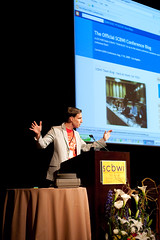This year for Christmas, I received a copy of The Emotion Thesaurus: A Writer’s Guide to Character Expression by Angela Ackerman and Becca Puglisi. I’m excited to dig into this resource! And you should be too—since I also have a copy of the eBook to giveaway!
I first discovered the Emotion Thesaurus when it was in blog form at The Bookshelf Muse. Last year, authors Angela and Becca published the Thesaurus. Somehow, I got lucky enough to also win a copy in the drawing and Angela has been kind enough to allow me to give it away here!
More about The Emotion Thesaurus: A Writer’s Guide to Character Expression:
One of the biggest problem areas for writers is conveying a character’s emotions to the reader in a unique, compelling way. This book comes to the rescue by highlighting 75 emotions and listing the possible body language cues, thoughts, and visceral responses for each. Written in an easy-to-navigate list format, readers can draw inspiration from character cues that range in intensity to match any emotional moment. The Emotion Thesaurus also tackles common emotion-related writing problems and provides methods to overcome them. This writing tool encourages writers to show, not tell emotion and is a creative brainstorming resource for any fiction project.
I know I’ll be using this a lot, especially when I’m fixing my gesture crutches.
How to win!
Entering the give away is pretty easy. You must leave a comment on this blog post AND fill out the Rafflecopter form to enter. You can also get additional entries by liking my page on Facebook, following me on Twitter, and/or Tweeting about this giveaway.
Details
One copy will be given away. Entries must be in by midnight EST, January 20, 2013. Winner to be drawn from Rafflecopter entries at random, announced Tuesday, January 21, 2013, and notified via post on this blog—so be sure to check back here!. EBook available in any of the following formats: Kindle, Nook, Kobo, iTunes, PDF.
Remember, to enter you must use the Rafflecopter form and leave a comment! How would you use The Emotion Thesaurus? What do you want to accomplish in 2013? What do you do when you get stuck? What would you like to learn this year?

 As I’ve worked on all these things, I’ve had to review all my favorite plotting methods and character posts—on others’ blogs, and on my own. So if you’re getting ready for NaNoWriMo, I’ll be sharing tips, strategies and advice to help you get the most out of your Nano experience.
As I’ve worked on all these things, I’ve had to review all my favorite plotting methods and character posts—on others’ blogs, and on my own. So if you’re getting ready for NaNoWriMo, I’ll be sharing tips, strategies and advice to help you get the most out of your Nano experience.




